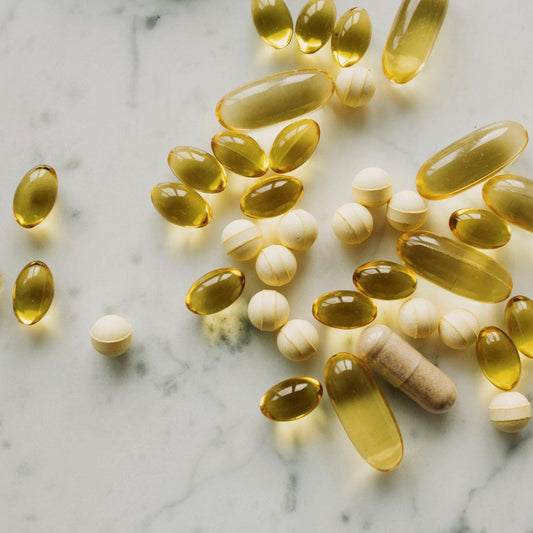
Vegan Omega 3 vs Fish Oil: Is Vegan Omega 3 as Good as Fish Oil?
Vegan Omega 3 vs Fish Oil: Is Vegan Omega 3 as Good as Fish Oil?
Whether you’re trying to reduce inflammation or improve skin and hair health, manage brain fog, or anything in between, the omega 3 fish oil benefits are impossible to ignore.
But those who adhere to a vegan diet find themselves in quite the conundrum, as this supplement won’t align with their needs. Fortunately, there are plant-based alternatives to fish oil that still deliver omega 3 fatty acids - like flaxseed, for example.
Is vegan omega 3 as good as fish oil, though? We’ll find out by comparing and contrasting vegan omega 3 vs fish oil below, looking at sources, benefits, drawbacks, cost, and more.
The truth is, though, you won’t get the same results as the specific omega 3 fatty acids found in plant-based sources are less bioavailable. In turn, you need to take a lot more to get the same effect.
That’s why you’re better off investing in your health and wellness here at Smarter Vitamins with the best omega 3 fish oil supplement online. Order yours today and see for yourself what a difference it can make in your life!
Essential Functions of Omega 3 Fatty Acids
Omega-3 fatty acids play a crucial role in maintaining and improving overall health. These polyunsaturated fats are not just a part of cell membranes throughout the body but are also essential for the functioning of various biological processes. Here are some of the most important:
Cardiovascular Health
They help regulate blood pressure, reduce triglyceride levels, and slow the development of plaque in the arteries.
By lowering the risk of arrhythmias (irregular heartbeats) omega-3s can decrease the likelihood of heart attacks and strokes. Their anti-inflammatory properties also help reduce vascular inflammation, further protecting cardiovascular health.
Brain Function and Mental Health
From fetal development through to old age, omega 3s are essential for brain health. They assist in the formation of cell membranes and the functioning of neurons.
High levels of omega-3 fatty acids are associated with improved cognition and reduced risk of neurodegenerative diseases. There is also a link to lower rates of depression and other mood disorders since these fats can positively influence neurotransmitter pathways.
Anti-inflammatory Properties
While acute inflammation is essential for your body’s healing, chronic inflammation can cause serious problems. It’s an underlying factor in many diseases, including type 2 diabetes, arthritis, and autoimmune diseases
Omega-3 fatty acids can reduce the production of substances and molecules linked to inflammation, such as eicosanoids and cytokines. This is why omega-3s are recommended for conditions like rheumatoid arthritis, where they can help decrease joint pain and stiffness.
Impact on Other Health Conditions
From eye health to skin health, the use cases for omega 3 fatty acids are seemingly endless. This single supplement can make a dramatic difference in your wellness regimen.
But, where should you get yours from - plant based omega 3 vs fish oil? Let’s get into the different sources you have at your disposal to help you make the most of this supplement.
Vegan Omega 3 vs Fish Oil: Differences in Sourcing
So many people assume that omega 3 and fish oil are synonymous, but this is not the case. Fish oil is just the most common source of omega 3. There are plenty of other sources, some of which are plant-based. These different sources can vary in their benefits and impact on health.
What is Vegan Omega 3?
The primary type of omega-3 found in plant sources is alpha-linolenic acid (ALA). ALA is an essential fatty acid, meaning the body cannot produce it and must obtain it from the diet.
However, it needs to be converted into the more active forms of omega-3, eicosapentaenoic acid (EPA), and docosahexaenoic acid (DHA), to provide the same benefits as those derived from fish oil.
The conversion rate of ALA to EPA and DHA in the human body is relatively low, typically around 5-10% for EPA and 2-5% for DHA. This varies based on genetics, diet, and health.
Some of the most common sources of plant-based omega 3 fatty acids include:
- Flaxseeds and flaxseed oil
- Chia seeds
- Hemp seeds
- Walnuts
- Algal oil (microalgae are a direct plant-based source of DHA and EPA)
Now, let’s look at the other half of the vegan omega 3 vs fish oil debate.
What is Fish Oil Omega 3?
Fish oil is obtained from the tissues of oily fish, with high concentrations of EPA and DHA, the active forms of omega-3 fatty acids that do not require conversion by the body.
These fatty acids are directly involved in numerous critical health functions, including inflammation reduction, brain development, and heart health.
Better yet, high-quality fish oil contains certain amounts of vitamins A and D, which are beneficial for the immune system and bone health. Not all fish oil is created equal, though, which is why the source matters. Here are some common fish with high levels of omega 3s:
- Mackerel
- Salmon
- Sardines
- Anchovies
- Herring
Given that the benefits from omega 3 fish oil are more direct, the fish oil vs vegan omega 3 debate is fairly simple: for better results, stick with the real deal. If you’re still on the fence, though, we’ll compare and contrast plant-based omega 3 vs fish oil below.
Is Vegan Omega 3 as Good as Fish Oil?
So, is vegan omega 3 as good as fish oil? The short answer is no. We touched on this in our similar resource comparing omega 3 fish oil vs flaxseed.
Efficacy in Reducing Inflammation
Is omega 3 fish oil good for inflammation? As a matter of fact, this is one of its most highly touted benefits! Numerous studies have shown that EPA and DHA from fish oil can significantly reduce symptoms in inflammatory conditions like rheumatoid arthritis and inflammatory bowel disease.
In contrast, vegan omega-3 sources like flaxseeds, chia seeds, and walnuts contain ALA that needs to be converted to EPA and DHA.
Given the lower conversion rate, it’s an inefficient means of supplementation. You have to take a lot more to get the same results, and then, you’re putting yourself at risk of omega 3 side effects from taking such high dosages.
Brain Health and Development
As we mentioned earlier, DHA influences brain health, cognitive function, and visual development. From omega 3 fish oil for pregnancy to omega 3 fish oil for kids, it assists with proper development of the brain and retina.
Fish oil provides preformed DHA, ensuring that the body has immediate access to this critical nutrient. We have more extensive guides on fish oil brain fog, fish oil for ADHD, and fish oil for memory if you’d like to learn more.
But how does its plant based counterpart stack up? Vegan sources of DHA, primarily from algal oil, do offer an alternative for those avoiding animal products. However, the availability and consistency of DHA from these sources can vary, and they often come at a higher cost.
And again - you’re still relying on the conversion of ALA to DHA, which ends up costing you a lot more in the long run to make up for the difference in terms of how much omega 3 you need per day.
Environmental Impact
You may assume that because it’s plant based, there is a clear advantage in comparing vegan omega 3 vs fish oil. That’s not necessarily true, though. The sustainability of fish oil has improved with advances in responsible fishing practices and aquaculture.
Many products now come from sustainably managed fisheries certified by organizations such as the Marine Stewardship Council (MSC). These measures help ensure that fish populations are not over-exploited and that marine ecosystems remain balanced.
That being said, it’s important that you understand how to tell if your fish oil is good quality. We also encourage you to read our guide comparing wild Alaskan fish oil vs fish oil for a more thorough understanding of the sustainability side of things.
But in giving credit where its due, plant-based omega 3 fatty acids are inherently sustainable as well. Sources like flaxseeds, chia seeds, and algal oil are all considered to be environmentally friendly.
Dietary Restrictions and Preferences
The unfortunate reality for vegans is that fish oil is not going to align with your dietary preferences or restrictions. While it’s the superior choice for the general population without dietary restrictions, vegans will have to settle for “second best” in a plant-based alternative.
Cost and Accessibility
Fish oil supplements are widely available and generally more cost-effective than vegan alternatives. We’ve touched on this already, but the high concentrations of EPA and DHA per serving make fish oil an even more economical choice for those seeking to meet their omega-3 needs since you can take less to get the same benefits.
Vegan omega-3 supplements, especially those derived from algal oil, tend to be more expensive and less readily available. The production process for algal oil is more complex and costly, contributing to the higher price point.
Harness the Full Power of Omega 3 With Fish Oil at Smarter Vitamins!
As you can see, there is a clear difference between vegan omega 3 vs fish oil. Plant-based sources have their place for those adhering to a vegan diet, but will fall short in terms of delivering results.
That’s why we encourage you to invest in the #1 omega 3 fish oil 1000mg at Smarter Vitamins. Our product has earned 15,000 positive reviews and counting for its potency and purity. Here’s what makes it the optimal solution for your wellness regimen:
- Superior Purity and Potency: Sourced from wild-caught, sustainable fish from pristine Alaskan waters, our fish oil uses AlaskOmega® for its high concentrations of EPA and DHA. How much omega 3 is in fish oil, though? You get 800mg EPA and 600mg DHA.
- Molecular Distillation: Now, how is fish oil made? We use molecular distillation to remove heavy metals, PCBs, and other toxins, ensuring you receive a pure and potent supplement without unwanted substances.
- Enhanced Absorption with MCT Oil: Our formulation includes MCT oil from non-GMO coconuts, boosting the absorption of omega-3s for maximum health benefits.
- Certified Quality: Third-party tested for purity and potency and manufactured in a cGMP-certified facility, meeting the highest standards of quality and safety.
Jumpstart your journey to better cardiovascular health, cognitive function, joint health, and overall well-being by reducing inflammation and promoting a healthy heart with our supplement.
Trusted by over 800,000 satisfied customers, we offer fast shipping and a risk-free satisfaction guarantee, ensuring you can achieve your health goals with confidence. So, order today and see what makes Smarter Vitamins your one-stop shop for superhuman supplements!
Bringing Our Comparison of Plant Based Omega 3 vs Fish Oil to a Close
So, is vegan omega 3 as good as fish oil?
From the omega 3 fish oil benefits for hair to the omega 3 fish oil benefits for skin, omega 3 fish oil for cholesterol, omega 3 fish oil for dry eyes, and everything in between, it’s clear that animal-derived omega 3 fatty acids are superior to their plant-based counterparts.
We hope this comparison of vegan omega 3 vs fish oil has left you with a clear understanding of why the plant based alternative falls short. Simply put, it doesn’t deliver the specific fatty acids your body needs most - at least, not in high enough concentrations.
Our blog has more resources on how long does fish oil take to work, cod liver oil vs fish oil, best time to take omega 3 fish oil, omega 3 fish oil for fertility, and more. But at this point, the only thing left to do is invest in your health at Smarter Vitamins.
Don’t settle for less with plant based omega 3 vs fish oil. Get the real deal and fuel your body with the nutrients it needs to perform and feel its best!
Get exclusive access to sales, discounts, new product launches, awesome content & more.
Once a month or so.

































